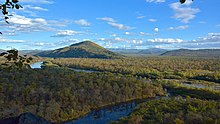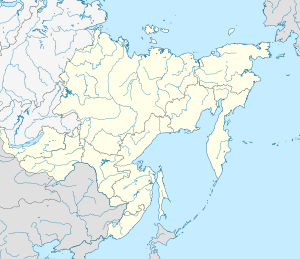Far Eastern Federal District
Far Eastern Federal District
Дальневосточный федеральный округ | |
|---|---|
 Location of the Far Eastern Federal District | |
| Country | |
| Established | 13 May 2000 |
| Administrative center | Vladivostok |
| Government | |
| • Presidential Envoy | Yury Trutnev |
| Area | |
| • Total | 6,952,600 km2 (2,684,400 sq mi) |
| • Rank | 1st of 8 (40.6% of the country) |
| Population (2021[2]) | |
| • Total | 7,975,762 |
| • Rank | 8th of 8 (5.6% of the country) |
| • Density | 1.1/km2 (3.0/sq mi) |
| • Urban | 73.6% |
| • Rural | 26.4% |
| GDP | |
| • Total | ₽ 8.656 trillion US$ 124 billion (2022) |
| • Per capita | ₽ 1,090,778 US$ 15,606 (2022) |
| Time zones | |
| Buryatia | UTC+08:00 (Irkutsk Time) |
| Amur Oblast, Zabaykalsky Krai and most of the Sakha Republic (excluding districts in UTC+10:00 and UTC+11:00 time zones) | UTC+09:00 (Yakutsk Time) |
| Jewish Autonomous Oblast, Khabarovsk Krai, Primorsky Krai, and the Oymyakonsky, Ust-Yansky and Verkhoyansky districts of the Sakha Republic | UTC+10:00 (Vladivostok Time) |
| Magadan Oblast, Sakhalin Oblast, and the Abyysky, Allaikhovsky, Momsky, Nizhnekolymsky, Srednekolymsky and Verkhnekolymsky districts of the Sakha Republic | UTC+11:00 (Magadan Time) |
| Chukotka and Kamchatka Krai | UTC+12:00 (Kamchatka Time) |
| Federal subjects | 11 contained |
| Economic regions | 1 contained |
| HDI (2022) | 0.769[4] high · 5th |
| Website | DFO.gov.ru |
 | |

The Far Eastern Federal District (Russian: Дальневосточный федеральный округ, IPA: [dəlʲnʲɪvɐˈstot͡ɕnɨj fʲɪdʲɪˈralʲnɨj ˈokrʊk], Latinized: Dal'nevostochnyy federal'nyy okrug) is the largest of the eight federal districts of Russia, but the least populated, with a population of around 8 million (73.6% urban) according to the 2021 Census. The federal district lies entirely within the easternmost part of Asia and is coextensive with the Russian Far East.
History
[edit]The Far Eastern Federal District was established on 13 May 2000 by President Vladimir Putin.[5] It is currently governed by presidential envoy Yury Trutnev. In November 2018, Buryatia and Zabaykalsky Krai were added to the federal district.[6] The seat of the Far Eastern Federal District was moved from Khabarovsk to Vladivostok in December 2018.[7]
On 15 July 2022, the first high-speed highway was opened in the Far Eastern Federal District. It united three federal highways – Ussuri (Khabarovsk–Vladivostok), Amur (Chita–Khabarovsk) and Vostok (Khabarovsk–Nakhodka), and connect the regional capital with Komsomolsk-on-Amur, as well as sites of the territory of the advancing socio-economic development (SAD).[8]
Demographics
[edit]
Federal subjects
[edit]
| ||||||||
|---|---|---|---|---|---|---|---|---|
| # | Flag | Coat of arms | Federal subject | Area in km2[1] |
Population (2021 census) |
GDP[9] | Capital/Administrative center | Map of Administrative Division |
| 1 | 
|
Amur Oblast | 361,900 | 766,912 | ₽531 billion | Blagoveshchensk | ||
| 2 | 
|
Republic of Buryatia | 351,300 | 978,588 | ₽342 billion | Ulan-Ude | ||
| 3 | 
|
Jewish Autonomous Oblast | 36,300 | 150,453 | ₽79 billion | Birobidzhan | ||
| 4 | 
|
Zabaykalsky Krai | 431,900 | 1,004,125 | ₽487 billion | Chita | 
| |
| 5 | 
|
Kamchatka Krai | 464,300 | 291,705 | ₽338 billion | Petropavlovsk-Kamchatsky | 
| |
| 6 | 
|
Magadan Oblast | 462,500 | 136,085 | ₽315 billion | Magadan | ||
| 7 | 
|
Primorsky Krai | 164,700 | 1,845,165 | ₽1,309 billion | Vladivostok | ||
| 8 | 
|
Sakha Republic | 3,083,500 | 995,686 | ₽1,616 billion | Yakutsk | ||
| 9 | 
|
Sakhalin Oblast | 87,100 | 466,609 | ₽1,234 billion | Yuzhno-Sakhalinsk | 
| |
| 10 | 
|
Khabarovsk Krai | 787,600 | 1,292,944 | ₽987 billion | Khabarovsk | 
| |
| 11 | 
|
Chukotka Autonomous Okrug | 721,500 | 47,490 | ₽136 billion | Anadyr | ||
| Year | Pop. | ±% |
|---|---|---|
| 1959 | 6,543,859 | — |
| 1970 | 7,737,678 | +18.2% |
| 1979 | 8,946,829 | +15.6% |
| 1989 | 10,359,773 | +15.8% |
| 2002 | 8,829,449 | −14.8% |
| 2010 | 8,372,257 | −5.2% |
| 2021 | 7,975,762 | −4.7% |
| Source: Census data | ||

Largest cities with a population over 75,000
[edit]There are 82 cities in the Far Eastern Federal District, and 13 cities have populations over 75,000.
Only four of these 13 cities (Komsomolsk-on-Amur (7th) in Khabarovsk Krai, Ussuriysk (9th), Nakhodka (11th), Artyom (12th) in Primorsky Krai) are not administrative centres of a federal subject. Anadyr, the centre of Chukotka Autonomous Okrug, is one of the smallest centres of a federal subject (it has only 13,045 inhabitants). Only Magas, the centre of Ingushetia, is smaller than Anadyr.
Artyom is a large suburb of the Vladivostok metropolitan area.[10]
Populations are given as of the 2021 census:
- Khabarovsk: 617,441
- Vladivostok: 603,519
- Ulan-Ude: 437,565
- Yakutsk: 355,443
- Chita: 334,427
- Blagoveshchensk: 241,437
- Komsomolsk-on-Amur: 238,505
- Yuzhno-Sakhalinsk: 181,587
- Ussuriysk: 180,393
- Petropavlovsk-Kamchatsky: 164,900
- Nakhodka: 139,931
- Artyom: 109,556
- Magadan: 90,757
Religion
[edit]According to a 2012 survey[11] 27.4% of the population of the current federal subjects of the Far Eastern Federal District (including Buryatia and Zabaykalsky Krai) adheres to the Russian Orthodox Church, 5.0% are unaffiliated generic Christians, 1.4% is an Orthodox believer without belonging to any church or adheres to other (non-Russian) Orthodox churches, 3.3% is an adherent of Buddhism, 0.7% is an adherent of Islam, and 2.2% adhere to some native faith such as Rodnovery, Tengrism, Yellow shamanism, or Black shamanism. In addition, 27.0% of the population declares to be "spiritual but not religious", 23.5% is atheist, and 9.5% follows other religions or did not give an answer to the question.[11]
Ethnicity
[edit]
The ethnic composition, according to the 2021 census (after the integration of Buryatia and Zabaykalsky Krai in 2018) was:
- Total – 6,979,578 people
- Russians – 5,674,671 (81.30%)
- Yakuts – 472,116 (6.76%)
- Buryats – 371,677 (5.33%)
- Ukrainians – 47,560 (0.68%)
- Evenki – 33,760 (0.48%)
- Koreans – 29,855 (0.43%)
- Tatars – 24,605 (0.35%)
- Uzbeks – 23,477 (0.34%)
- Armenians – 20,185 (0.29%)
- Kyrgyz – 19,659 (0.28%)
- Evens (Lamuts) – 19,561 (0.28%)
- Tajiks – 17,812 (0.26%)
- Chukchi – 15,686 (0.22%)
- Azerbaijanis – 13,011 (0.19%)
- Nanai – 11,424 (0.16%)
- Chinese – 8,396 (0.12%)
- Belarusians – 7,944 (0.11%)
- Koryaks – 7,292 (0.10%)
- Kazakhs – 4,614 (0.07%)
- Bashkirs – 4,391 (0.06%)
- Nivkh – 3,758 (0.05%)
- Germans – 3,564 (0.05%)
- Chuvash – 2,906 (0.04%)
- Moldovans – 2,851 (0.04%)
- Mordva – 2,675 (0.04%)
- Jews – 2,529 (0.04%)
- Ulchi – 2,431 (0.03%)
- Yukaghir – 1,747 (0.03%)
- Itelmens – 1,486 (0.02%)
- Mari – 1,230 (0.02%)
- Individuals who did not indicate nationality – 996,184 (12.49%)
Presidential plenipotentiary envoys
[edit]| № | Name (envoy) | Photo | Term of office | Appointed by | ||
|---|---|---|---|---|---|---|
| Start of term | End of term | Length of service | ||||
| 1 | Konstantin Pulikovsky | 
|
18 May 2000 | 14 November 2005 | 5 years, 180 days (2,006 days) | Vladimir Putin |
| 2 | Kamil Iskhakov | 
|
14 November 2005 | 2 October 2007 | 1 year, 322 days (687 days) | |
| 3 | Oleg Safonov | 
|
30 November 2007 | 30 April 2009 | 1 year, 151 days (517 days) | |
| 4 | Viktor Ishayev | 
|
30 April 2009 | 30 August 2013 | 4 years, 122 days (1,583 days) | Dmitry Medvedev |
| 5 | Yury Trutnev | 
|
31 August 2013 | present | 11 years, 75 days (4,093 days) | Vladimir Putin |
See also
[edit]- Far North (Russia)
- Far Eastern economic region
- Eastern Military District
- Far Eastern Republic
- Manchuria (Northeast China)
- Russian Manchuria
References
[edit]- ^ a b "1.1. ОСНОВНЫЕ СОЦИАЛЬНО-ЭКОНОМИЧЕСКИЕ ПОКАЗАТЕЛИ в 2014 г." [Main Socioeconomic Indicators 2014]. Regions of Russia. Socioeconomic indicators – 2015 (in Russian). Russian Federal State Statistics Service. Retrieved 26 July 2016.
- ^ "Provisional results of the 2020 All-Russian population census" (in Russian). Rosstat. 30 May 2022. Retrieved 30 May 2022.
- ^ Валовой региональный продукт по субъектам Российской Федерации в 2016-2022 гг., rosstat.gov.ru
- ^ "Sub-national HDI – Area Database – Global Data Lab". hdi.globaldatalab.org. Retrieved 20 July 2021.
- ^ Putin, V. (13 May 2000). "Указ Президента Российской Федерации о полномочном представителе Президента Российской Федерации в федеральном округе" [Decree of the President of the Russian Federation on the Plenipotentiary Representative of the President of the Russian Federation in the Federal District] (in Russian). Retrieved 27 June 2024 – via Wikisource.
- ^ "Официальный интернет-портал правовой информации". publication.pravo.gov.ru. Archived from the original on 5 February 2022. Retrieved 4 November 2018.
- ^ "Путин перенес столицу Дальневосточного федерального округа во Владивосток". meduza.io. Retrieved 13 December 2018.
- ^ "Доев Дмитрий: "Обход Хабаровска" – флагман дорожных концессий Группы "ВИС"". PRIMPRESS.RU (in Russian). Retrieved 30 March 2023.
- ^ "Валовой региональный продукт". rosstat.gov.ru.
- ^ Подписано соглашение о создании Владивостокской агломерации (in Russian)
- ^ a b c "Arena: Atlas of Religions and Nationalities in Russia". Sreda, 2012.
- ^ 2012 Arena Atlas Religion Maps. "Ogonek", № 34 (5243), 27 August 2012. Retrieved 21 April 2017. Archived.
External links
[edit]- Meeting of Frontiers: Siberia, Alaska, and the American West (includes materials on the Russian Far East) (in English and Russian)
- Unofficial website of the Far Eastern Federal District (in Russian)
| Federal districts of Russia | |
|---|---|
| North Caucasian | Central | Southern | Northwestern | Far Eastern | Siberian | Ural | Volga | |

